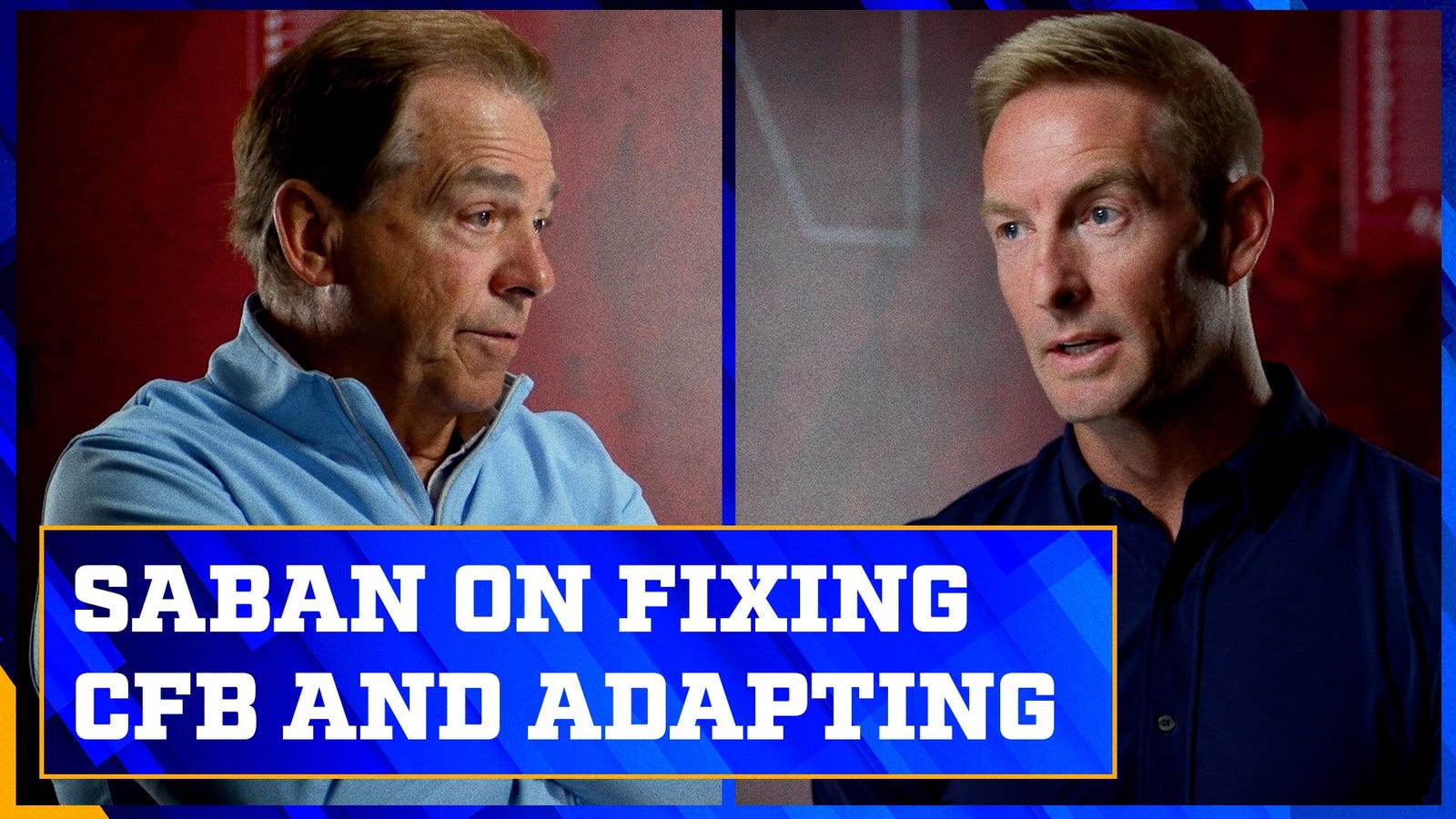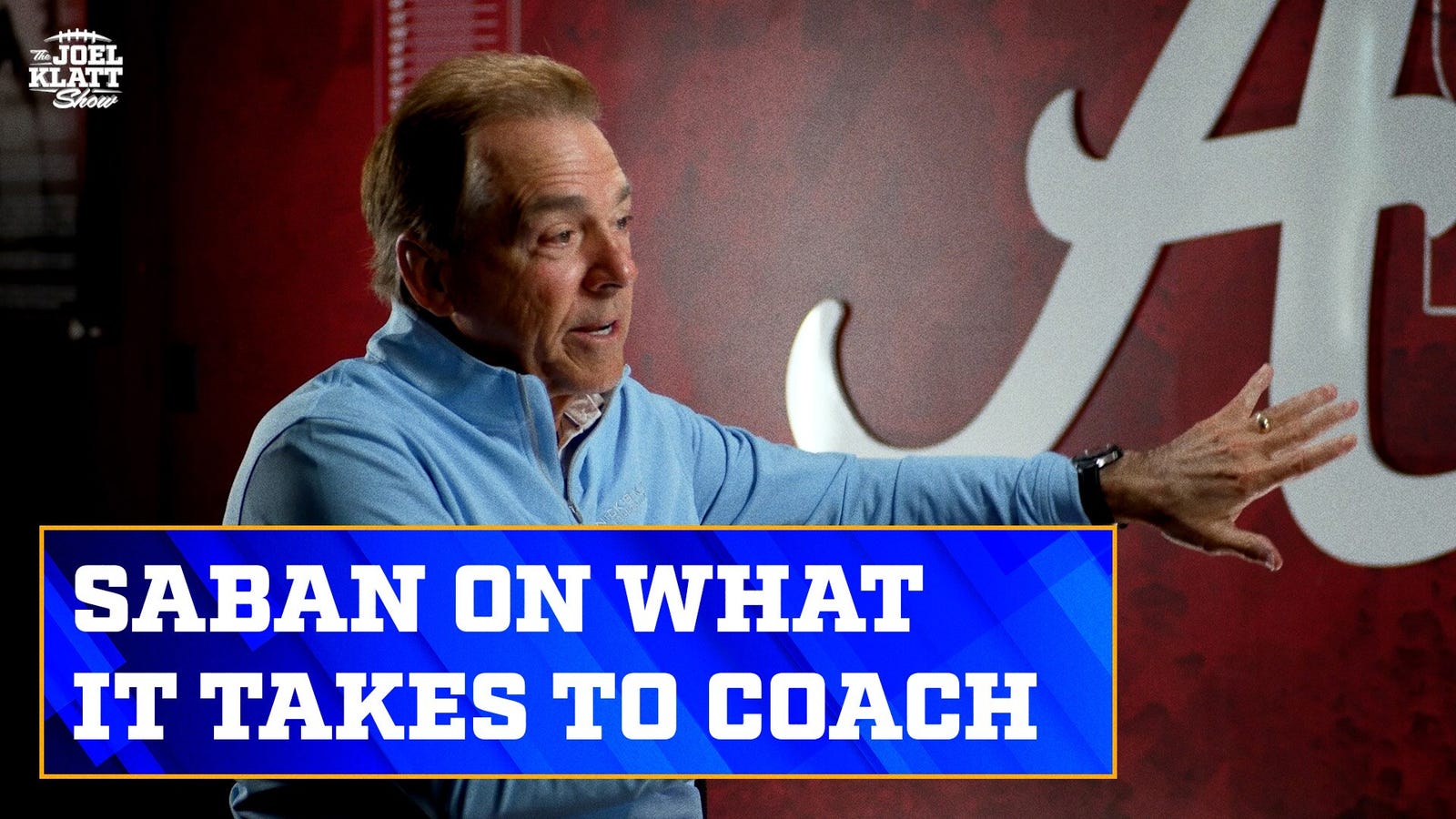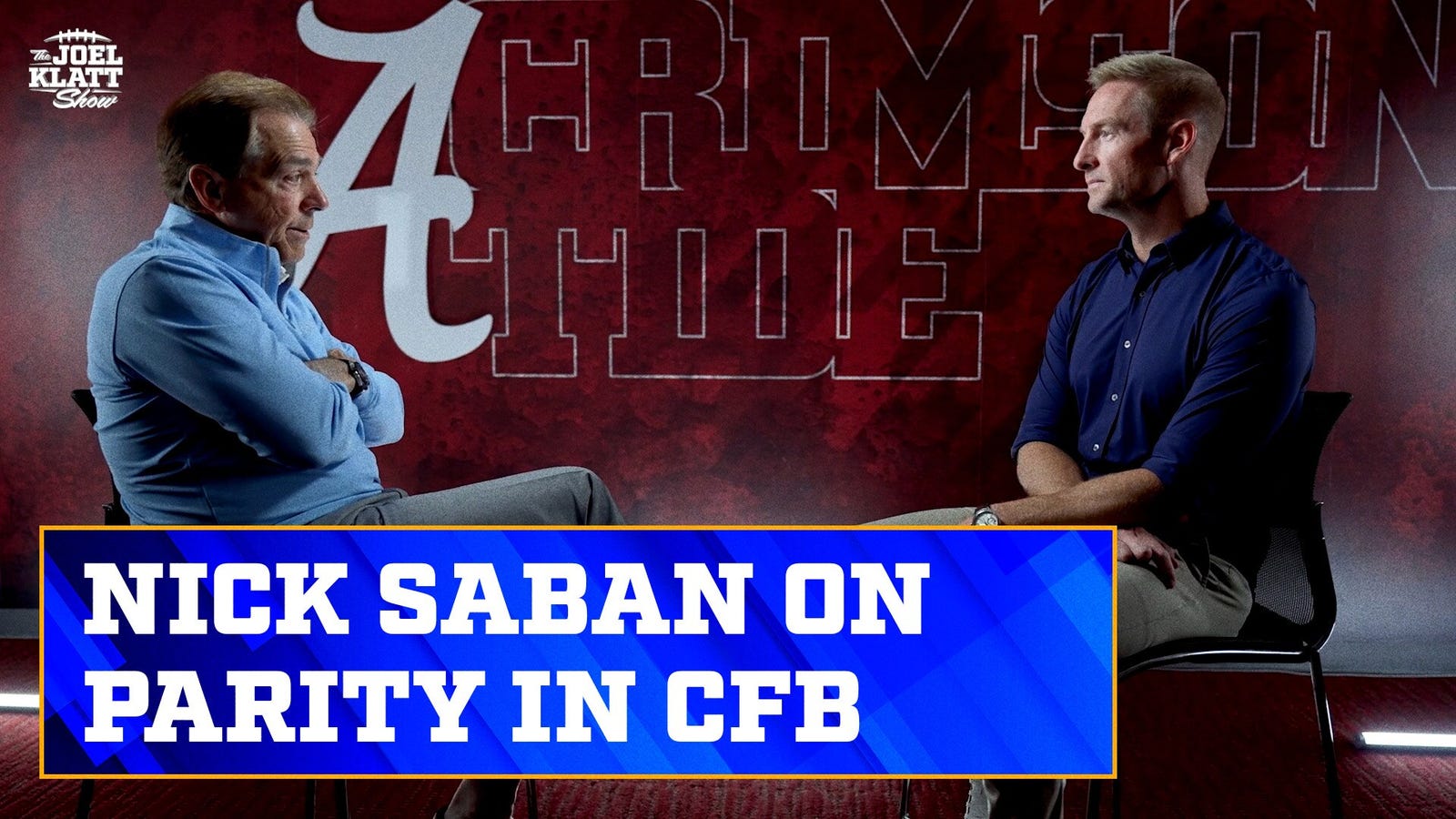Editor’s Note: This summer, FOX Sports college football analyst Joel Klatt is interviewing the biggest names in college football as part of his new podcast series, “The Joel Klatt Show: Big Noon Conversations.” The following is an excerpt from Episode 2, featuring Nick Saban. You can listen to Episode 1 with Deion Sanders here.
As Joel Klatt wrapped up a recent sit-down interview with Nick Saban for his summer podcast series, “The Joel Klatt Show: Big Noon Conversations,” the legendary Alabama head coach surprised him with an out-of-the-blue proposition.
“Listen,” the seven-time national champion said, “we got a job for you if you want to be a coach.”
Nick Saban – always the ultimate recruiter.
ADVERTISEMENT
Klatt’s interview with the 71-year-old coach, which was released Monday, focuses on the recent changes throughout the college football landscape, including how to properly navigate NIL and the transfer portal, and Saban’s ability to adapt in his recruiting and retention efforts in his 50th year in coaching.
Saban is a firm believer of creating a clear balance between how much players take and how much they give.
“We’re giving people scholarships, we’re creating NIL opportunities, but what is their commitment?” Saban said. “There is no place in the world where you don’t have a contract. If you’re going to receive benefits, you have a contract and obligation to do a certain job. So, when you can opt out, transfer, do whatever you want, whenever you want, wherever you want, I’m not sure the balance is quite right.
“At the end of the day, when you create an atmosphere where somebody is tentatively committed to what they’re trying to accomplish, you have to evaluate if that is really a good thing because we all need to be totally committed to whatever our goals and aspirations are and the sense of purpose that we have, if we’re going to have a chance to be successful.”
Nick Saban on fixing college football and the importance of adapting
Joel Klatt sat down with Alabama coach Nick Saban to discuss how to fix college football and the importance of adapting in the sport.
While there have been plenty of seismic changes that have occurred throughout college football over the past five years, including the introduction of NIL and the transfer portal, Alabama is one of the programs that has been able to sustain constant success through it all. That is a direct result of Saban’s unique ability to successfully adapt to the always evolving landscape, both on and off the field.
Known as a coach who built his career on running the football and hard-nosed defense, Saban recognized a change in how offenses were operating in the mid 2010s and made the decision to incorporate RPO (run-pass-option) concepts into Alabama’s offense, which in return, put opposing defenders in conflicted situations whether to play pass or run.
The move paid immediate dividends as Alabama’s offensive production reached new heights following the 2015 season and took another massive leap when Tua Tagovailoa took over under center. The 2018 Alabama team put together one of the most dominant offensive seasons in SEC history, averaging 55.7 points and more than 520 yards per game.
“You have to be flexible,” Saban said. “If you’re flexible, then you have a willingness to adapt. I think your willingness to adapt is really important because things are always changing.”
When it comes to adapting to the constant off-the-field changes, including the influx of players jumping from school-to-school after the transfer portal was officially introduced in 2018, Saban says his philosophy surrounds building a program that creates value for the players, which in return, provides added incentive to stay and see the process through from start to finish.
“If we can do a better job from a relationship standpoint and build a program that creates more value for the players, then they’re gonna be more happy here, they’re gonna want to stay here, they’re gonna buy into the fact that long term, I can create more value for myself by staying here in the program,” Saban said. “That’s the way we try and look at all of these challenges in order to improve the program we have here.”
As for how NIL has impacted recruiting, Saban is confident in his belief that he – as well as his staff – will continue to bring elite-level athletes to Alabama, but how quickly and effectively they progress as players within his system will determine the success they have on the field.
“Really, the proof is in the pudding once the players get here because the focus has to be on their development and what they develop into,” Saban said. “That’s what we try to stay focused on.”
Nick Saban on what it takes to coach and thoughts on the recruiting process
Joel Klatt sat down with Alabama coach Nick Saban to discuss the recruiting process and what it takes to coach.
One would be hard-pressed to find a coach that has embraced the power of recruiting and development quite like Saban. Since taking over as Alabama’s head coach back in 2007, Saban has secured the top-ranked recruiting class in the nation in 10 of his 17 years at the helm.
It is recruiting – or “the chase” as he refers to it as – that sets the foundation for Saban’s Alabama squads, because he knows that any coach can create a masterful game plan on paper, but to properly execute it, you must have the right people in place.
With an abundance of talent returning next season and the nation’s top-ranked recruiting class on the way, expectations will be sky-high once again for Saban’s Alabama team heading into the 2023 college football season.
The same can be said for the likes of Georgia, Ohio State, LSU and Clemson, as those five schools (Alabama included) have combined to win 11 of the past 12 national championships, including every title since the College Football Playoff was introduced back in 2014.
The CFP is set to expand to a 12-team model starting in the 2024 season, which is expected to create more parity throughout the sport, something Saban says has been a challenge for quite some time now.
Nick Saban on whether the expanded playoff will lead to more parity
Joel Klatt sat down with Alabama coach Nick Saban to discuss whether the expanded playoff will lead to more parity in college football.
“All leagues want to create parity because parity creates a lot of excitement,” Saban said. “It’s harder to do in college because we have so many different teams and the fundamentals are different at Alabama then say at a I-AA school, a Division II school, even a lower-half Division I school. The money is different, the dynamics are different, the investment in the athletes and the program is different. Value created for the athlete is different.”
What isn’t different is the expectations for Alabama’s football program. And it will continue to be that way year-in and year-out, as long as Saban is in charge.
“Our fan base … they want to dominate,” Saban said. “So my job is to try and create a program where we have the best chance to succeed and have success relative to the competition.”
COLLEGE FOOTBALL trending

Get more from College Football Follow your favorites to get information about games, news and more















